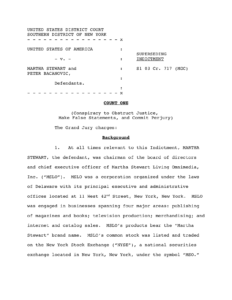Federal law criminalizes certain statements and acts intended to interfere with the investigation of crimes and the administration of justice. This broad category of crimes includes perjury offenses, false statements, and obstruction of justice.
What are 18 USC 1001 False Statements?
False statements are criminalized under 18 U.S.C. § 1001. This law covers false statements made to law enforcement agencies like the FBI or to federal prosecutors in the Department of Justice, as well as false statements or acts taken to hide information from other agencies within the three branches of the federal government. The law covers oral statements, such as statements to agents interviewing you. It also covers written statements, such as lying on forms. A statement does not have to be under oath in order to qualify under this law.
Like perjury charges, the government must prove that the statement is materially false. The person making the statement must do so with the intent to deceive the government, rather than merely making a mistake.
One unique fact about false statements charges is that prosecutors sometimes rely on them when they have weak evidence or even a lack of evidence for another crime. So, for example, FBI agents show up and start asking you questions. You get nervous. You might be nervous simply because talking to a federal agent can be a scary experience. You may be nervous because you know about something that another person did, and you think this somehow implicates you. You may know that you did something wrong, or you might mistakenly believe that you committed a crime when you have not. You start making statements that are not true, hoping that the agent believes you and drops the whole thing. Now, all of a sudden, the prosecutor has a crime to charge you with.
As you can probably tell already, these charges have serious consequences.

Are Federal False Statements a Misdemeanor or a Felony?
A felony. False statements charges carry up to five years in prison, or, if the offense involves terrorism or certain types of sex offenses, up to 8 years. It can also carry fines. But, the advisory sentencing range for false statements are determined by the sentencing guidelines.
In the typical case (one not involving sex offenses or terrorism), the federal sentencing guidelines for false statements are determined by a number of factors. Normally, guidelines section 2B1.1 (the same section that governs sentencing for fraud, embezzlement, and other theft offenses) applies. This guideline has many potential enhancements, such as the dollar amount if the offense involves loss of money to a victim, and others. For example, if the offense involved false statements on a background check to purchase firearms, the number of firearms would determine the amount of the enhancement.
In some case, another guidelines section will control, where the “conduct set forth in the count of conviction establishes an offense specifically covered by another guideline.” In other words, if another guideline specifically addresses the offense, that guideline may apply. This small technical point can have massive consequences for sentencing.
What is the Statute of Limitations for False Statements?
The statute of limitations is five years, from the time the statement was made or submitted.
Are There Any Defenses to 18 USC 1001 Charges?
There are numerous potential defenses to false statement charges, depending on the facts and circumstances of a particular case. As we explain in the beginning of this page, the prosecution has to prove that the statements were made knowingly. This means that an honest mistake is not enough. Unlike many laws, the prosecution must also prove that the statements were made willfully, which is a legal term that says the person generally knew their conduct was against the law.
Before making a decision to speak with authorities or sign a form that subjects to to possible criminal liability, you should know your legal rights. Working with an experienced federal criminal defense attorney is the surest way to protect yourself from being charged with making a false statements.
